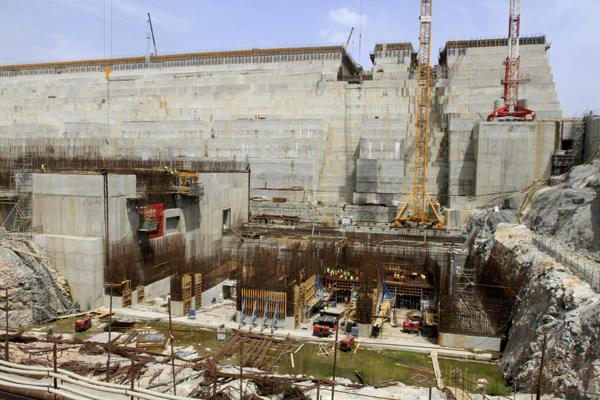PBS: Escaping Eritrea … [Read More...] about ካብ ውሽጢ ቤት ማእሰርታት ኤርትራ
Pre-summit tension
Doaa El-Bey | 18 February, 2016 | AL-AHRAM
Egyptian-Ethiopian differences regarding the Renaissance Dam are as wide as ever ahead of a planned meeting between President Abdel-Fattah Al-Sisi, Ethiopian Prime Minister Hailemariam Desalegn and Sudanese President Omar Al-Bashir, reports Doaa El-Bey
The 12th technical meeting of the tripartite committee on the Renaissance Dam was held last week. It was the first time the committee had met since they agreed that French consultancy firms Artelia and BRL should produce studies on the dam’s impact.

The meeting had been expected to kick-start the consultancy firms’ work. This now appears to not be the case.
“Not only did the participants fail to sign the contract to start the studies, recent statements by Ethiopian officials show Addis Ababa is determined to stick to its prearranged plans,” said a diplomat speaking on condition of anonymity. “And all the talks and studies — whenever they start and end — will lead us nowhere.”
The committee did agree to meet again in Addis Ababa to sign the contract, but only after a number of “outstanding technical issues are resolved”. No date for such a meeting, however, was set.
Recent statements from senior Ethiopian officials have undermined the credibility of the Ethiopian negotiating team, said Nader Noureddin, professor of agricultural resources at Cairo University. According to Noureddin, these statements show that Addis Ababa has ambitions to control the flow of Nile water.
“Ethiopia refuses to deal with the Nile as an international river. It treats it only as a river that passes through its territory, the water flow of which it can regulate regardless of how this affects states upstream,” he said.
In an interview with the BBC, Motuma Mekasa, Ethiopia’s minister of water, irrigation and energy, said construction work on the Renaissance Dam will continue during the preparation of the impact studies, which it is estimated will take a year to complete.
He added that plans to inaugurate the dam in 2017 have not changed, arguing there is no reason to delay the opening. Mekasa insisted Ethiopia takes Egypt’s concerns regarding its water supply seriously and said he is confident differences will be resolved through the tripartite talks.
Earlier, Ethiopia’s Foreign Minister Tedros Adhanom told parliament that plans to begin filling the reservoir behind the dam will proceed as timetabled.
The two officials’ statements, said Noureddin, “leaves no shadow of doubt that Addis Ababa will not make any concessions regarding water quotas to Sudan and Egypt, a flagrant violation of the declaration of principles singed last year.”
The failure to sign the consultancy contracts and the statements made by Ethiopian officials will cast a long shadow on next week’s meeting between President Al-Sisi, Ethiopian Prime Minister Desalegn and Sudanese President Al-Bashir, due to be held on the sidelines of the African Investment Conference.
The decision to hold the summit was reached after talks between Egypt’s Foreign Minister Sameh Shoukry and Adhanom at last week’s security conference in Munich.
It will be the second meeting between Al-Sisi and Desalegn this year. They met in Addis Ababa on the sidelines of the AU summit.
The dam has long been the cause of differences between Cairo and Addis Ababa. Egypt has repeatedly expressed concerns to Ethiopia over the dam’s effect on its supply of Nile water. Ethiopia insists the dam’s main purpose is to generate electricity and it will not negatively affect Egypt’s share of Nile water.
In December the Egyptian, Sudanese and Ethiopian foreign and irrigation ministers signed the Khartoum Agreement which stipulates work on filling the reservoir behind the dam can begin only after all technical studies are complete. It also allows field visits to the construction site by Egyptian and Sudanese experts.
“The latest statements from the ministers of irrigation and foreign affairs show plans to build the dam and fill the reservoir will go ahead before the studies — scheduled to be ready by October this year — are complete,” said the diplomat.
In a confidence-building measure in March 2015, Egypt, Ethiopia and Sudan signed a declaration of principles on the dam that included the provision that none of the signatories would harm the interests of the others.
The dam is intended to be Africa’s largest hydroelectric power plant with a storage capacity of 74 billion cubic metres of water. Partial operation is likely to start by the middle of this year.
Egypt depends on the Nile for 95 per cent of its water needs. Most of this water comes from the Blue Nile. Under a treaty agreed in 1959, Egypt receives 55.5 billion cubic metres of Nile water while Sudan receives 18 billion cubic metres.
The failure of the technical track to achieve tangible progress on the ground has left many commentators hoping for a political solution. “Perhaps next week’s summit will allow the presidents of Egypt, Sudan and Ethiopia to sit together and try to find a way out of the impasse,” said the diplomat.
